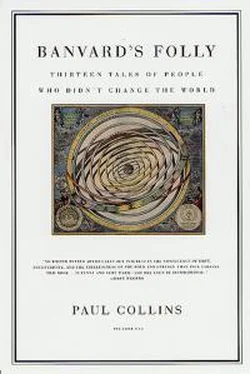How did this come to pass, that a book so widely commented upon should be so little read? The answer, as anyone who picks up a copy of her work soon finds out, is appallingly simple.
It is unreadable.
To watch a brilliant mind unravel into madness is one of the most painful sights imaginable. As the medicines and nostrums fail, and the babble sets in, there comes a time when one gives up on such acquaintances: you cannot hold a conversation with them, because they are simply making no sense. And yet it is not an obvious madness; that is not how the human mind works, nor how it fails. Educated madness retains all the syntax and cadence of rational, educated discussion. It sounds sane. But when strung together, the words make no sense.
And so it is in The Philosophy of Shakespere's Plays Unfolded. Biographical accounts tend to excuse Bacon's tortured writing and frequent incoherence on the grounds that she was really a lecture hall orator, not a writer. But this claim soon falls apart: well before Philosophy, after all, she had written two perfectly readable published works, a novel and a play. Take, for example, this passage from the title story in her 1831 volume The Regicides: When the subtle spirit of popular superstition is once aroused, it floats not long in unsubstantiated rumor; the airy nothing soon finds a local habitation and a name. So it was in the present instance. The mountain which rears its head about two miles west of the village, was at length declared a favorite haunt of the unearthly visitant. ... It became, at last, generally reported and believed, that just as the white mist began to break away from the rock, a female form of exquisite, but faded beauty might be seen standing amid the wreathing vapor, and gradually vanishing as it slowly curled from the mountain.
It's a fine bit of local New Haven legend, and prose that would scarcely be out of place in a volume by Washington Irving or Nathaniel Hawthorne. But twenty-six years later in her Philosophy, after nearly six hundred tortured pages of endless circling around her claims without ever getting to the point or to actual proofs we find buried in the text this almost ungraspable attempt at summarizing her book's thesis:
This is the philosophy precisely which underlies all this Play,--this Play, in which the great question, not yet ready for the handling of the unlearned, but ripe already for the scientific treatment,--the question of wrestling forces,--the question of the subjection and predominance of powers,--the question of the combination and opposition of forces in those arrested motions which make states, is so boldly handled. These arrested motions, where the rest is only apparent, not real--where the yielding forces are only, as it were, annihilated, whether by equilibrium of forces, or an absolute predominance, but biding their time, ready to burst their bonds and renew their wrestling, ready to show themselves, not as subjects, but as predominators--not as states, but revolutions. The science "that ends in matter and new constructions"--new construction, "according to true definitions," is what these citizens, whom this Poet has called up from their horizontal position by way of anticipation, are already, under his instruction, boldly clamouring for. Constructions in which these very rules and axioms, these scientific certainties, are taken into account, are what these men whom this Magician has set upon their feet here, whose lips he has opened and whose arms he has unbound with the magic of art, are going to have before they lie down again, or, at least, before they make a comfortable state for any one to trample on, though they may, perhaps, for a time seem, "as it were, annihilated." ...
And so a great mind is overthrown. Bacon is desperately wrestling with an idea here, a coherent idea. But it is like light trying to pass through several panes of cracked glass-bent through layer after layer, until it is refracted and twisted into a wraith of reason.
Predictably, the critics were merciless in their savagery--and those that did not ridicule the book simply ignored it. But it scarcely mattered anymore. By the time Philosophy came out, Bacon was almost senseless. She continued to linger in Stratford-on-Avon, a ghostly and deranged presence. She slipped in and out of fevers, accused her kindly landlord of stealing from her and plotting against her, and dragged herself to the doorstep of the mayor of Stratford to complain. The mayor took pity on her and spent months caring for her. When she turned suicidal, and began claiming to be a descendant of Francis Bacon, he had her committed to an asylum.
Just before her committal, though, Bacon had scribbled a cryptic message on a scrap of paper--a letter to herself, perhaps, and an epitaph of sorts to her sanity:
it was a mmrble mmt when you at the Avn. The signs of it are in the strt whether you understand them or not. There reason in those reasons whether you observe them or not. You have forded the Avn. You have untied the spell.
Theres reason in the whole. You have crossed the Avon twice. You crossed it in the E. and you crossed it in the West. You crossed the old in the n Haven. The E in the West and you crossed the New, the West in the East. History rest in me a clue and run a right spirit millim me.
Bacon slipped into madness so deep that she could not tend to herself.
Friends shipped her back to America, and her brother arranged for her to live in a New Haven asylum that they had innocently walked past many times in her former life.
Her fevers continued on and off for over a year, until one day her brain burned for the last time, and the tortured genius inside writhed no more.
The first to give her story to the world was Nathaniel Hawthorne, who contributed the essay "Recollections of a Gifted Woman" to the January 1863
issue of The Atlantic Monthly. Much of Hawthorne's essay is a meditation on
the town of Stratford itself; he seems unable to turn fully to the story of the ghost that inhabited it. "This is," he sighs, "too sad a story." And Hawthorne had given more to Delia Bacon than she ever knew; without her knowledge, he had secretly pledged to the publisher to cover the losses on her book. This quiet act of friendship, which he stuck to even after Bacon shut him out of her life, cost him l238. The whole affair, he mused, had turned into a sinkhole: "No author ever hoped so confidently as she; none ever failed more utterly."
And yet, at the margins of Shakespeare scholarship, a few still cling to her notions. What began as a metaphorical cipher has become, to some, an actual cipher, with hidden identities and messages to be found in the plays through elaborate numerologies. The height of the approach probably came with the great American eccentric Ignatius Donnelly, who took a break from pondering the lost world of Atlantis to pen the thousand-page Baconian tome The Great Cryptogram (1888). And Francis Bacon, who only existed to Delia Bacon as the probable head of a cabal, has become to some the man behind Shakespeare.
Few scholars are impressed.
In 1888, Theodore Bacon put out the family biography of Delia, and it is a fascinating and rare volume. There is a battered copy in the archives of the San Francisco Public Library. Scrawled in ancient pencil near the end of the book, just as her impending death looms in the narrative, is a hopeful cry across the years from a long-gone library patron:
The ignorance ... the superficially "cultured" ignorant in their brutal attack upon her published life's work--drove her, beaten and broken into insanity. The battle and burden had been too long and too heavy the heart and mind of the noble little woman failed altogether, But, wait! Wait! Delia Bacon--your day, your glorious day is coming!
13 WALKING ON THE RINGS OF SATURN
LUNAR HUMANOIDS
We were thrilled with astonishment to perceive four successive flocks of large winged creatures, wholly unlike any kind of birds, descend with a slow even motion from the cliffs on the western side, and alight upon the plain. They were first noted by Dr. Herschel, who exclaimed, "Now, gentlemen, my theories against your proofs, which you have often found a pretty even bet, we have here something worth looking at: I was confident that if we ever found beings in human shape, it would be in this longitude!" --FROM THE NEW YORK SUN, AUGUST 28, 1835
Читать дальше











